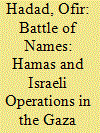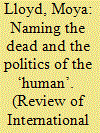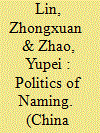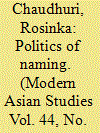|
|
|
Sort Order |
|
|
|
Items / Page
|
|
|
|
|
|
|
| Srl | Item |
| 1 |
ID:
182999


|
|
|
|
|
| Summary/Abstract |
This paper addresses the phenomenon of military operation-naming, that is, the act of giving names to war practices. Based on the four strategies of War Normalizing Discourse theory, I argue that, like nation-states, violent non-state actors also use the tool of naming to disseminate their wartime perceptions and mobilize public opinion for their own interests. Moreover, I argue that in its war-naming efforts the violent non-state actor seeks to defy and undermine the official names of its enemy state, using its own names to expand the physical battlefield to other fields of war and to present itself as an equal and legitimate player. To establish the above arguments, the article presents the case study of Hamas—specifically, the movement’s naming of rounds of fighting against Israel since the beginning of its rule in the Gaza Strip in 2007.
|
|
|
|
|
|
|
|
|
|
|
|
|
|
|
|
| 2 |
ID:
151639


|
|
|
|
|
| Summary/Abstract |
The summer of 2014 saw several campaigns to name the dead of Gaza. This article aims to explore these initiatives through the idea of the ‘human’; understood both in terms of grievability, as a life that matters, and as a ‘litigious name’ employed by subaltern groups to make political demands. My argument in this article is that politically not all attempts at nomination are equivalent and that a distinction needs to be drawn between those carried out on behalf of the ‘ungrievable’ and those engaged in by them. Only the latter enables a critical politics of the human potentially capable of transforming the prevailing order of grievability in order to make their lives count. After exploring the interventions that occurred in Gaza in 2014, I turn to how the Western (and Israeli) media represent international deaths to consider what that reveals about the differential valuation of human life. To help make my case I elaborate the idea of an order of grievability. I then explore various attempts by others to name Gaza’s dead, and the limitations of their ensuing politics, before finally examining the activities of Humanize Palestine as an example of a more radical, critical politics of the human.
|
|
|
|
|
|
|
|
|
|
|
|
|
|
|
|
| 3 |
ID:
190188


|
|
|
|
|
| Summary/Abstract |
This article focuses on the carnival aspects of Chinese Internet culture, but it goes further by suggesting that the productiveness of the online carnival leads to the politics of naming in China’s specific context. This article illustrates the questions of how Chinese Internet users name themselves diaosi (“losers”) to separate and distance themselves from the governing power, how they identify the Zhao (“elites”) to form an internal antagonistic frontier in the “us vs. them” context, and how the diaosi are “floating” and appropriated as xiaofenhong (“little pinkos”) to identify the external enemy rather than the rulers inside. This kind of online carnival is not merely a cultural issue, but is also a political and governing theme that has its roots and routes in contemporary China’s governing rationality.
|
|
|
|
|
|
|
|
|
|
|
|
|
|
|
|
| 4 |
ID:
096275


|
|
|
|
|
| Publication |
2010.
|
| Summary/Abstract |
Henry Derozio, India's first modern poet, used the pseudonym 'An East Indian' for several poems he published in his lifetime, and he may have used it again in a heated controversy that played itself out in the correspondence columns of the India Gazette, Calcutta's leading newspaper, from May 26 to June 5, 1825. The occasion was an editorial comment upon a community of office-goers in the city-called, at the time, 'sircars'-who had set up a literary association. This editorial was widely perceived to be reactionary, and civil society responded vigorously in protest at the injustice. The sequence of editorials and letters published on this issue, which seem to have been written by Englishmen, East Indians and Indians alike, demonstrate a remarkable liberalism of spirit and a free-thinking attitude to ethnicity that was soon to disappear in the stiffening boundaries of a racially divided society. 1825 was also the year that Derozio began to publish prolifically in the poetry columns of newspapers and periodicals in the city; by the time he died, in 1831, he had published two books of poems in 1827 and 1828 and had created a revolution of sorts among the radicalised youth of the Hindu College, from which he had been dismissed for his role in their alienation from tradition. In 1831, a few months before his death, Derozio addressed a mammoth meeting called to commemorate the return of John Ricketts, the East Indian representative, from his mission to the English houses of Parliament for a redressal of the community's grievances. Using these two lost occasions-the public correspondence and the meeting-both concerned with the politics of naming, this paper will attempt to present the early radical interventions of the mixed-race community in initiating a discourse of civic rights and human dignity which led, ultimately, to organised attempts at constitutional change and political reform in India, whose estimation is underrated in present-day contexts.
|
|
|
|
|
|
|
|
|
|
|
|
|
|
|
|
|
|
|
|
|